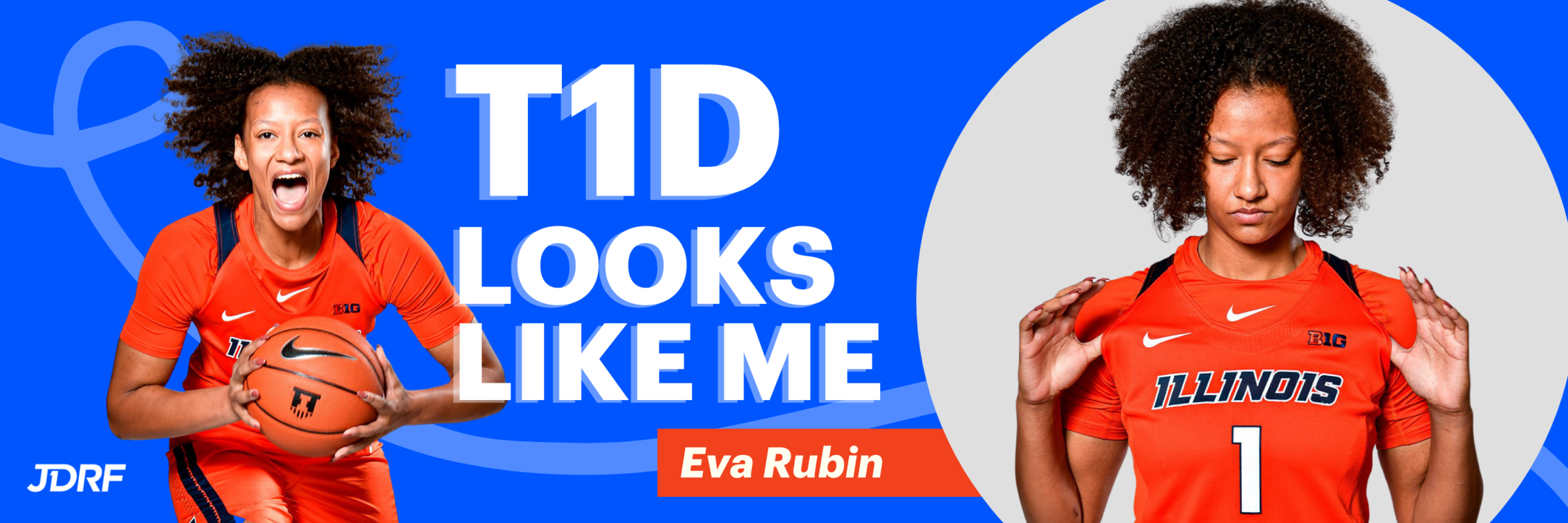T1D Looks Like Me: Eva Rubin

Eva Rubin is helping build the University of Illinois women’s basketball program. But she’s also showing how athletes with type 1 diabetes (T1D) can excel.
Eva was diagnosed with T1D around age 13, after multiple episodes of extreme thirst and frequent restroom breaks. Hearing she had diabetes “was confusing,” she said. “I did worry about basketball (when diagnosed),” said Rubin. “I actually missed middle school basketball tryouts because I was in the hospital. I was concerned about being able to play with my diabetes.
“The first thing that came into my mind was Nick Jonas and how he is a diabetic. I was like, well, if Nick Jonas has diabetes and he’s doing all kinds of stuff, I will too.”
A few years later, Eva grew tired of having to make healthy decisions and monitor her health so closely. When her doctor refused to sign paperwork that would allow her to get her driver’s license, “it was a wake-up call.”
She developed healthier eating routines, but there were still stigmas and pressures, often involving sports.
Rubin said sometimes coaches didn’t understand why she needed to take breaks. Afraid of losing time on the court or facing criticism, she would push herself to compete despite her sugar-level warning.
“It’s a tough thing to understand when you don’t have it yourself or know anyone who does,” Rubin said. “If I have to miss 20 to 30 minutes of practice or I’m having a tough week, there’s a level of frustration that I’ve had to deal with. That can be hard because I put a lot of effort into managing this. The thing with diabetes is you can do everything right and still have a terrible blood-sugar day.”
Coach Nancy Fahey’s commitment to developing well-rounded players and Illinois’ health resources helped draw Rubin to Champaign. Fahey has a niece with diabetes and also coached a player with the disease when she was at Washington University in St. Louis.
“You have to have a trust to understand what they’re going through,” Fahey said. “If I don’t have the respect to (listen to her), then I shouldn’t be her coach.”
At practices, athletic trainer Autumn Taylor places color-coded cards on the gym wall to indicate where Rubin’s sugar levels are so she can see them from the court. The stoplight system includes a green card for safe, yellow for caution and red for needing to stop.
Rubin wears a continuous glucose monitoring device that uses a Bluetooth connection to send her levels to her phone and to an app on Taylor’s phone so she can monitor Rubin’s levels during practices and games.
Because of her health experiences, she has dreamed of becoming a nurse. She’s majoring in public health at Illinois and said she might pursue a career in that field because of the pandemic.
Eva Rubin is living proof that type 1 diabetes does not have to stop you from achieving your dreams. Although living with T1D it is not an easy road, with hard work, determination, and persistence, anything is possible.
Sited: Chicago Tribune